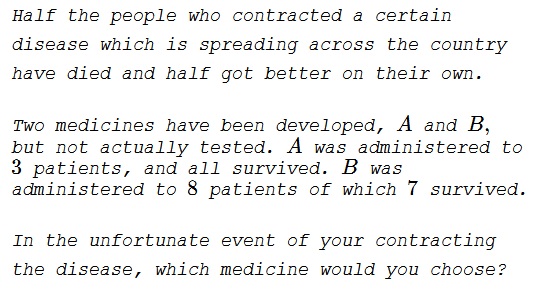Taking Chances with Your Medicine
Problem

Solution
From the available data we may assume that, without any medicine your chances of survival 50:50,$70:80$,$30:70$,$50:50$. We shall never know whether either medicines does more good than harm. What we can estimate and compare are the chances of survival without taking any medicine.
There were 3,$3$,$4$,$5$ patients treated with $A.$ Were they not, the three of them would survive with the probability of $\displaystyle \left(\frac{1}{2}\right)^3=\frac{1}{2^3}.$
The probability of having seven survivors out of eight is 8\cdot\frac{1}{2^8},$8\cdot\frac{1}{2^7}$,$\frac{1}{2^7}$,$8\cdot\frac{1}{2^8}$ which is $\displaystyle \frac{1}{2^5}=\frac{1}{32}.$
Thus, the probability of having seven survivors out of eight is 4,$2$,$4$,$8$ times smaller that having three survivors out of three. There is a good chance that medicine B,$A$,$B$ proved to be more useful than medicine A,$A$,$B$.
Reference
- R. Honsberger, Some Surprises in Probability, in Mathematical Plums, by Ross Honsberger (editor), MAA, 1979, 97-98
|Contact| |Front page| |Contents| |Probability| |Up|
Copyright © 1996-2018 Alexander Bogomolny
73757265
